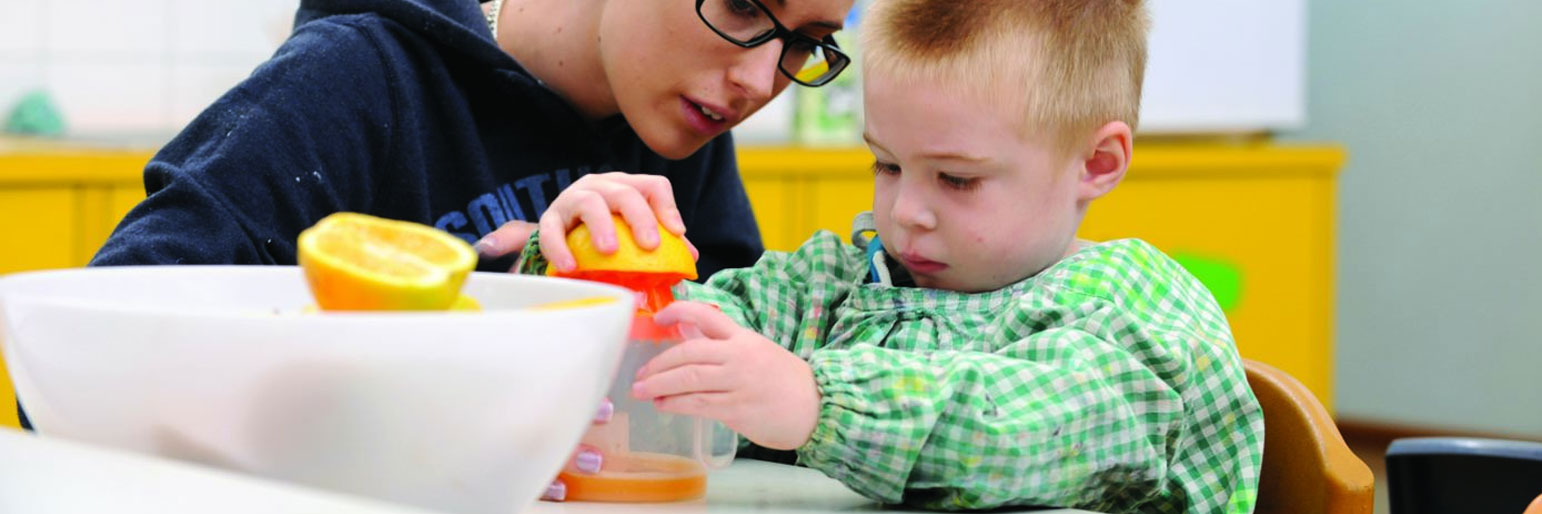Fun with food
Learning together
Everyday activities like cooking are chances to talk, wonder and learn.
Activity
In this activity, children will have the opportunity to have a go at using real tools from the kitchen, such as peelers, graters and knives. Parents/carers will see their children as confident and capable with using everyday kitchen tools, and may then feel confident in letting their children practice their new skills and help in the kitchen at home.
What you'll need
- A table with room for 2–4 children with their parent/carer alongside them.
- Peeler (x4)
- Grater (x4)
- Chopping boards (x4)
- Child safe knife (x4)
- Mortar and pestle
- Vegetables for peeling and/or grating such as carrot, apple, zucchini.
- Fresh herbs for chopping or crushing in a mortar and pestle –basil, rosemary, parsley.
- Dried herbs/spices for grating or crushing in the mortar and pestle, such as cloves, gingerroot, cinnamon sticks, seed pods.
- Washing tub with water, sponge and detergent to wash utensils after use.
TIP – If your site has a community garden you may find vegetables, herbs or other leaves there – or children may like to bring in veggies/herbs from their own gardens at home. You could use this as an activity to explain when and where things grow. Children may also like to bring in veggies/herbs from their own gardens at home, or those they have purchased from the shops (see shopping fun activity).
Words to use
- Name all tools and vegetables being used, and parts of the vegetables – root, stem, leaves, skin, peel.
- Notice and name all the actions – chop, cut, peel, slice, grind, grate, bang, beat, mix.
- Notice and name the textures – course, slimy, juicy, fine, thick, soft, squishy, rough, dry, chunky, powder.
- Notice and name quantities – full cup, half full, empty, lots, more, less, a bit.
- Notice and name colours.
Questions to discuss
- Do you know the name of this fruit or vegetable?
- What does it smell like?
- What does it feel like?
- What colour is it?
Learning through play
Ways to develop numeracy through play
- Measurement language – full, empty, less, more.
- Talk about the size and amount of the vegetables “You had a whole carrot and now you have grated half of it! It’s much smaller now!”
- Fractions – half, quarter, part, all.
- You may like to include measuring equipment such as:
- kitchen scales
- measuring cups
- spoons, rulers.
Ways to develop literacy through play
- Hearing and saying new words extends vocabulary.
- Exposure to new foods, tools, and how they’re prepared extends children’s understanding of the world.
- Look at recipes and cookbooks together.
- Write shopping lists together.
- Books about food/cooking:
- Oliver’s Vegetables by Vivian French
- Oliver’s Fruit Salad by Vivian French
- Wombat Stew by Marcia K. Vaughan
- The Very Hungry Caterpillar by Eric Carle.
Extensions and variations to this activity
- Food preparation during playgroup:
- making sandwiches
- squeezing orange juice
- making fruit kebabs
- cutting fruit for shared fruit.
- Making potions – use flowers, leaves, herbs, gumnuts, water, etc with the mortar and pestle to make potions.
- Look at a recipe that uses some of these new skills and cook it together, such as vegetable or fruit pancakes.
- Visit the greengrocer or farmer’s market. Children can select their own veggies.
- Plant a small garden in a planter box with quick growing veg/herbs to pick and use in this activity at playgroup (basil, parsley, radish, spinach).
Supporting parent engagement in play
Play prompts:
This is an activity that needs parents/carers to be close to their child, to keep them safe, and help with using the cooking tools when needed.
Parents or carers can:
- Comment on what their children are doing (say what they see).
- Talk in their home language.
- Use literacy and numeracy words (see words to use section above).
- Extend vocabulary by using describing words.
- Pick vegetables/herbs together.
- Feel confident to support their children in the kitchen at home.
You can help families by:
- Modelling what you want them to do.
- Incorporating healthy food-based activities into your playgroup
- Providing recipe ideas for families to do at home together
- Talking to them about the focus of the activity and what children might be learning.
- Writing up words that go with the activity.
- Making suggestions on what families can do at home.
- Encouraging parents/carers to be with their children.
Related Great Start activities
Great Start activities are for parents and carers to do with their children.


